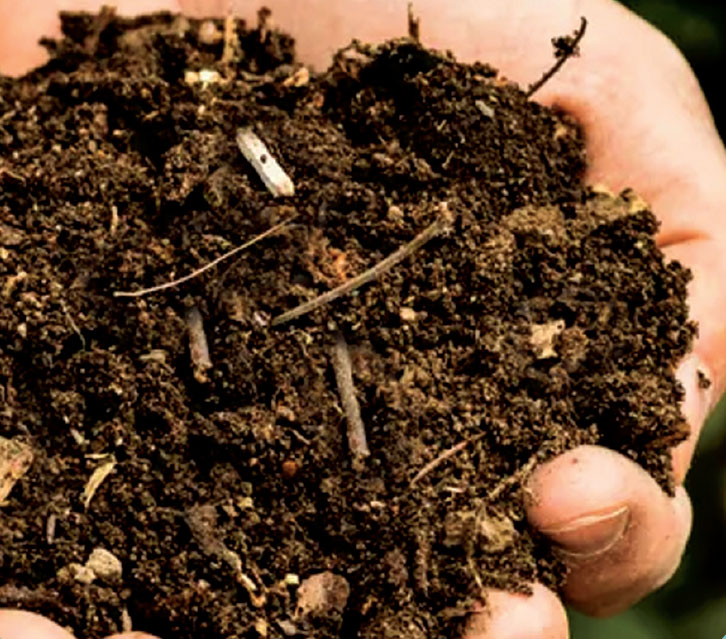
(Reprinted here with permission from the author.)
SOIL is our lifeline. It sustains life with a variety of foods, holds and filters water to provide us with clean and safe potable water and maintains ecological balance by storing carbon. But Pakistan has played havoc with its soils. We refused to accept that soil is much more than just a combination of minerals in rock material in the form of sand, silt and clay. We started deep tillage and mono-cropping was preferred over biodiverse fields. Inorganic chemical fertilisers and pesticides replaced natural soil rejuvenating practices and water-intensive seed varieties were imposed on the farmers.
The result was massive destruction of the soil’s microbial life, which nature deploys to help plants produce delicious and nutritious food. Bacteria and fungi decompose dead organic matter. Without these decomposers, dead materials will pile up, causing unimaginable pollution and making life impossible. They break down the organic waste and recycle it to process food for plants.
Another group of microbes has taken on the role of mining minerals from the rock material in the soil. They make the organic acids that break down crystalline structures of the rocks into sand, silt and clay.
There is yet another set of microbes that partner with certain plants, colonise their roots and fix nitrogen. These microbes thrive in favourable conditions and grow massively. Their huge populations attract their predators — protozoa, nematodes, and microarthropods that feast on the bacteria and fungi and keep their population under control. The predators’ intake contains more nutrients in their bodies than they need. They excrete the surplus nutrients. The excreted matter, referred to as ‘predator poop’, contains nutrients that plants need and are in a form that plants can uptake.
As we know, plants make food through photosynthesis and store 20 per cent to 85pc of that energy (depending on the category of plants) in their roots. However, the sugars produced through photosynthesis are not enough and don’t fulfil their nutritional requirements. They also need a wide range of minerals to grow, maintain their health, and produce healthy, delicious, and nutrient-dense food. They offer 30pc to 40pc of the photosynthetic food stored in their roots to soil bacteria and fungi to attract them, which fulfils different food requirements of all species of beneficial bacteria and fungi. The microbes respond positively. They are lured to the plant roots and colonise them.
Predator poop contains soluble inorganic nutrients in plant available form. Plants take up the nutrients they require, get great returns on their investment, and grow happily and healthily. Some of these microbes in the soil travel to the above-ground parts of the plant and cover stems, leaves, flowers and fruits. Here too, the exchange between the plants and the microbes takes place.
This is nature’s way of nutrient cycling and providing nutrients to the plants. There are no nutrients that are lacking in the soil. Nutrients are massively more than enough to grow plants. No plants depend on us to add inorganic chemicals to the soil. However, deep tillage and massive use of agricultural chemicals have resulted in the loss of biodiversity and soil degradation, costing Pakistan’s economy over Rs365 billion every year. We are facing gigantic challenges of salinity and sodicity, waterlogging, soil erosion, depletion of soil fertility, imbalance of nutrients, decline in productivity, droughts and desertification. Sixty-two million hectares of Pakistan’s land, almost 80pc of the total area, is vulnerable to desertification.
We urgently need to respond to the crisis. The most cost-effective and sustainable solution lies in following nature by bringing life back to the soil. Agroecology is an approach to agriculture that seeks to integrate ecological principles into farming systems, emphasising biodiversity conservation, natural pest control, climate change mitigation and sustainability. Agroecological practices are low-cost, can ensure higher productivity, relieve farmers of the back-breaking costs of chemical agricultural inputs and enable them to build a soil structure with a sponge-like ability to hold water and prevent waterlogging or drought stress. This shift can lead to a sustainable economy and rescue our farmers from the spiral of debt, disease, pollution and food insecurity.
To reap the wide-ranging benefits of agroecology, we need a strong political will that heralds a fundamental policy shift, detailed planning and robust implementation to protect our soils and climate from corporate greed. We must remember nature doesn’t need us, we depend on it for our survival.
The writer is an educationist, environmentalist and ecological gardener.